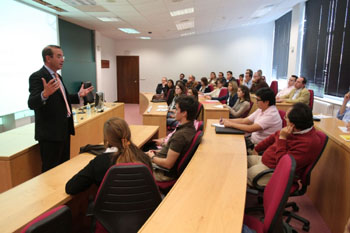Jaime Urcelay: "A business is socially manager before anything else by being a good business"
The president of Profesionales por la Ética gave the lecture "La Responsabilidad Social Corporativa en la business actual" in the framework of the Chair Bancaja Jóvenes Emprendedores Universidad de Navarra.

Are you sure that CSR is not just a fad?
To a large extent it is very much a fad, since it has a strong marketing and image component. It should therefore come as no surprise that the Financial Times published in its prophecies for 2008 that, in the inevitable cycle of business fads, CSR is already heading for its demise. Certainly there are elements that might lead one to think that CSR was a kind of tribute that the business world had to pay to certain social trends, to certain demands or to certain aspects of the economic situation. But it is also true that CSR is a fashion that has a transcendent component: it responds to a much deeper need in the nature of business and of organizations.
-How can we distinguish companies that develop social responsibility policies just for the sake of fashion?
I believe that the closer the model of Social Responsibility of a business is to its business, to its daily life, to its basic processes, to its strategy, the more authentic its CSR will be. The further it is removed from the day-to-day activity of the business company and the more it is a mere window-dressing of activities far removed from the core of its day-to-day operations, the more likely it is that we are dealing with a CSR policy conceived merely as a question of image.
-After noting that many of the companies whose bad practices caused the financial crisis had CSR policies, can we conclude that there has been a lot of fashion in the financial world around this topic?
? Yes, indeed. The fact that CSR has been taken up only as a question of image is consistent with the fact that many are saying that the financial crisis has also represented a crisis of values. It is worth asking whether a properly understood CSR would have prevented the crisis, because social responsibility, properly understood, implies a certain pretension to incorporate an ethical approach to financial, economic and business activity. A business is socially manager first and foremost by being a good business, complying with the mission statement that is proper to it, carrying out its activity from agreement to the nature that corresponds to it as business. One of the things we have seen with the crisis is that the survival of companies in difficult situations like the current one depends to a large extent on the quality of their management in the medium and long term deadline. Only well-managed companies can survive.
Which aspects of CSR are more mature in Spanish companies and which are less so?
For years, Spanish companies understood CSR as social action, and focused their efforts on this area. Then the emphasis shifted to topic environment, and today the latest fad is equality, work-life balance and diversity. That's all very well: CSR is all that, but it is also much more. CSR is an ethical attitude that permeates the whole organization and guide its relationship with its clients, suppliers, its own workers, the place in which it operates...
-Spanish consumers state in surveys that they care about the ethics of companies. Is this reflected in their purchasing decisions, or do they only take into account the price factor?
There is an obvious schizophrenia there. There is a dissociation between what we declare and our consumption habits, especially in the Spanish case. However, the data is irrelevant insofar as it can mark a trend and a future evolution that is significant and must be considered.
-At present, does not being unethical have any cost for companies?
It is difficult to quantify, but there are indications that it must have some impact. There is the example of the big sports transnationals, denounced a few years ago for using child labor in the manufacture of their products. These companies have invested heavily in social projects, which suggests that the accusations had some impact on their economic results. I do not believe that they have invested in social action only out of philanthropy, out of humanitarianism.
